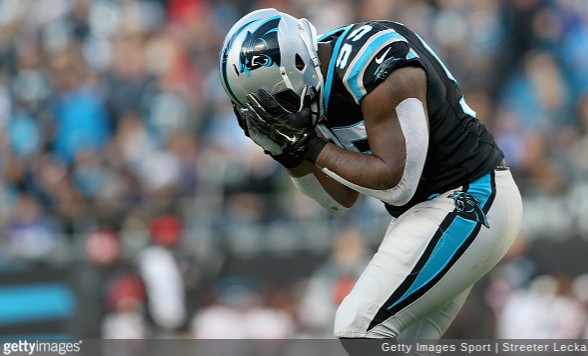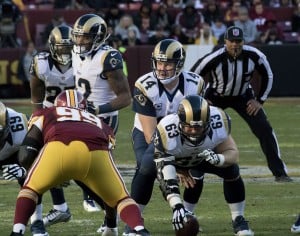I remember sitting next to my dad as we took a break from chores to enjoy some Sunday football. Dad was a Chicago Bears fan, so naturally I was as well. He would call out plays before they happened – a tight end slant into the endzone or a draw play. We bonded over his love and knowledge of the game.
Football is also common in Jesuit communities. Many of us play Turkey Bowl games, chaplain our high school teams on Fridays, work on lesson plans during Saturday college games, and take a break from Monday night grading to watch pro football.
Just as the NFL advertises, football is family.
Despite it being a family event, I can no longer watch football. I’m giving it up. Yes, just in time for the Super Bowl. I want to keep enjoying the game and participating in the easy camaraderie that comes from too many Cheetos and collective gasps and groans. But I can’t.
Football has too many unaddressed issues of racial, sexual, and economic oppression. Between concussions, stadium fiascos, and sexual assault, it’s simply an industry I can no longer watch or condone.
– – –
Concussions have dominated recent stories about football. A growing number of parents don’t want their children to play. Will Smith recently portrayed Dr. Bennet Omalu in “Concussion,” a film about the doctor who broke the story on NFL-related head trauma. As Chicago Tribune writer John Kass puts it, the movie shows the “flesh peddlers” who make massive amounts of money on the lives of humans while hiding the evidence about horrible trauma from football. Some players turn to painkillers and marijuana to fight off the pain. The damage is real and devastating.
TJP’s own Chris Schroeder already asked, “Are you ready for the consequences?” Can we overlook the human pain we support each time we turn on the game?
Perhaps like many others, you say to yourself, “Well of course, that’s simply part of the game that players accept when they walk onto the field. Football doesn’t hurt anyone else.” Except it does.
First, let’s look at how it has economically damaged cities. According to a study by the Taxpayers Protection Alliance, taxpayers have spent almost $7 billion financing stadiums, but there is “strong consensus” among economists that the costs outweigh the benefits.
The St. Louis Rams were recently part of a particularly ugly fight for a new stadium. St. Louis City and the state of Missouri offered $150 million in tax dollars for a new $1.1 billion stadium. Many asked if they should spend that tax money on billionaires when St. Louis’ high schools had a 53% graduation rate in 2011. In fact, the city was still struggling to pay off the old stadium they had first used to bring the Rams to St. Louis. Despite promises of a new stadium, owner Stan Kroenke instead filed for a move to Los Angeles. The NFL gladly accepted.
Perhaps questions of spending tax money don’t interest you much. What about the extreme amount of sexual violence that accompanies football? A recent report found that football games correlate with a spike in sexual violence. Home games at Division 1 colleges correlate with a 41% jump in reported rapes by women 17-24 years old. Upsets, blowouts, and rivalry games led to even high numbers — up to an 82% increase in sexual assault.
Along with game days, players from several prominent teams have been accused of sexual violence. The University of Tennessee football program, for example, is undergoing a federal investigation accusing six different players of sexual violence. Al Jazeera reports that players at the universities of Oklahoma, Florida State, Wisconsin, Brown, Texas, Miami, Florida, Kentucky faced sexual assault accusations with varying levels of repercussions — and sometimes none.
To accompany economic and sexual oppression, football runs into deep challenges of racism. The issues of racism gained greater recognition thanks to University of Missouri football players going on strike to fight for racial justice. Easily-seen disparities stand out, such as the limited number of coaches and quarterbacks of color (though this has been shifting). Or perhaps the United Southern and Eastern Tribes passing a resolution to end the name “Redskins” should help us realize the racism lingering in football.
Harder to notice is the institutional racism. In a Journal of Issues in Intercollegiate Athletics literature review from 2012, Wycliffe W. Simiyu Njororai states that collegiate athletics build on a narrative that black males can only succeed via athletics. College, while an opportunity to obtain a degree, is more focused on athletic success than long-term life skills. Indeed, white student-athletes have a much higher graduation rate than black student-athletes. Njororai further argues that university communities treat black students on campus simply as laborers there to play football for the enjoyment and profit of the school.
Sadly, football also commodifies individuals and communities, supporting a throwaway culture. Football exemplifies the way that we put a pricetag on human life. If a player with a great career starts to break down, we can always replace him in the following draft. The communities that host teams are important — until another can provide a greater profit.
Football itself may very well not be the problem. Perhaps football is a symptom of deeper issues in the United States, such as racism and economic injustice. I want to be a football fan, but it leaves me too uneasy. I can’t blame those who do enjoy the game, but I can’t ignore the nagging discomfort.
No doubt, I’ll keep the memories and enjoyment I found in the football family, but the path ahead is clear for me. I’m giving up football — just in time for the Super Bowl.



